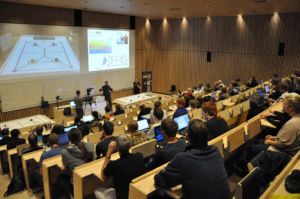News
Science News in Brief: Engineering students present green energy project for Africa at P4G Summit
This article is more than 7 years old.

Will the reforms help or hinder studetns? (photo: Institut for Datalogi, Aarhus Universitet)
Six third-semester engineering students will represent Aarhus University with their own invention at the P4G Copenhagen Summit (Partnership for Green Growth and the Global Goals 2030), which takes place between October 19 and 20.
The group has designed a prototype flexible and modular solar cell pavillion which can be used in rural areas of Africa to provide both shade and green energy.
They have been collaborating with a Dutch company that will look into the possibility of putting the pavillion into production and distribute it in Zambia in south-central Africa, where just over five percent of the rural population has access to electricity.
Taking the lead
“As engineering students, it’s our job to take the lead with technology for sustainable solutions and show that economic growth and achieving global goals can easily go hand in hand – also in developing countries,” said Mads Dalkjær Riis, one of the diploma engineering student at Aarhus University’s Engineering College.
He added that those goals had inspired the project and that he and his fellow students felt extremely honoured to be allowed to attend the summit.
Grim outlook for mammals
Slowly but surely the earth appears to have entered another period of mass extinction – for the sixth time. Already before the existence of mankind, natural disasters and meteorological impacts caused the environment on earth to change so much that the majority of plant and animal species were eradicated. Yet each time evolution ensured that new species emerged, restoring the earth’s biological diversity. This time, however, researchers from Aarhus University have calculated in a study recently published in the recognised scientific journal PNAS, that human activity is so damaging to other mammals it will take to 7 million years before evolution can restore the biodiversity of mammalian species, if mammal species continue to die at the current rate.
READ ALSO: Science News in Brief: Museum appeals to volunteers to help document butterflies
New turbines in Denmark’s largest windpark
A total of 49 of the world’s biggest offshore wind turbines are on their way to Denmark’s largest windpark, the Horns Rev 3 park located in the North Sea, 30 km from the coast of Esbjerg, reports DR Nyheder. With its 187 meter high wind turbines, the new park can cover the electricity consumption of 425,000 households. Most of the turbines are already installed and the energy company Vattenfall is working flat out to get the remaining technology in place as soon as the weather conditions permit it.
Lyngby Campus wins German architecture award
The Biosphere atrium in Lyngby Campus’ new building has received a prestigious award from the German architecture magazine Details. The building was designed by Christensen & Co Arkitekter as well as Rørbæk and Møller. “Due to the strict and balanced composition of the room, the atrium not only impresses with its social function but also with its special atmosphere,” wrote Detail’s jury in justifying the award. The 13 metre high atrium is the heart of the new building, which houses the university’s research and teaching environment in life science and bioengineering at Lyngby Campus.
Copenhagen opens cemetery for Buddhists
At Copenhagen’s Bispebjerg Cemetery, the newly established Buddhist Settlement Association has now opened the first Danish burial area for Buddhists, reports Kristeligt Dagblad. The 108 square metres of land were inaugurated and blessed by three Tibetan lamas, enabling Danish Buddhists to be burried along with their members of their religious community. Until the opening, Buddhists could only be laid to rest in urns in a nearby entrance hall.
TV2 reveals food-fraud
Last Thursday, TV2’s ‘Operation X’ revealed that the company Jelex Seafood has sold salmon infected with the dangerous listeria bacteria to a customer in Spain by falsifying the listeria analysis. After finding a total of six falsified listeria analyses sent out by Jelex Seafood to customers, the Danish Food Agency has reported the company to the police in an attempt to prevent its director, Jens Elsnab, transacting further food-related business. Elsnab declined to comment on the case. However, a hidden tape-recording caught him stating that he was not bothered about listeria as he believes that all his customers will heat up the salmon before eating it.










































